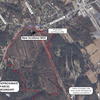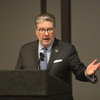Science teacher Alan Fiero says the work must go on to protect the Karner blue

GUILDERLAND — Last Thursday, local, state, and federal agencies held a press conference to announce that, at the Pine Bush Preserve, the endangered Karner blue butterfly had exceeded the federal recovery threshold.
There were fewer than 1,000 of the quarter-sized butterflies at the preserve in 2007; last year, there were 15,000. The local preserve is one of 13 federal recovery units for the butterfly that was first identified in the 1940s by novelist Vladimr Nabokov in Karner, New York.
Alan Fiero, who retired this year from teaching science at Farnsworth Middle School, has spent decades working with his students to girdle aspen trees and build fences to protect the lupine Karner blues rely on, and even to breed the now-rare butterflies.
This week, Fiero shared his philosophy on teaching science and spoke about the importance of continuing such efforts in this week's podcast.
— Melissa Hale-Spencer Subscribe to The Enterprise on your podcast app, like iTunes(Apple), Stitcher, Google(Android), etc.


